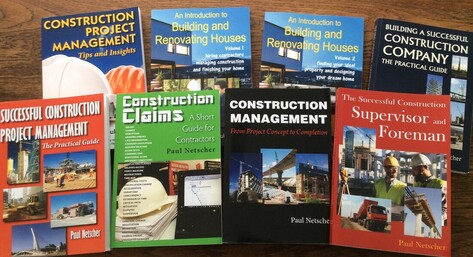|
Love them or hate them we all attend meetings and even call meetings. These days many meetings are held remotely via Zoom, Microsoft Teams, and similar, which at least saves travel time. Yet even so we still bemoan the fact that meetings waste time and often achieve little – even though sometimes we called the meeting. In construction we seem to be always attending meetings. Meetings with the client, subcontractor meetings, staff meetings, and more. Some managers seem to love calling meetings. A meeting to discuss this, a meeting for that. Sometimes these meetings are a complete waste of time without any firm resolution or outcome. But, some meetings are important, and a properly managed meeting can yield satisfactory outcomes - yet even these meetings can waste more time than they should. Can we cut down on wasted time and get value from our meetings. Well let’s look at the top reasons meetings waste time. Avoid these 12 meeting time wasters1. Meetings must start promptly. Most meetings start 5 or more minutes late. If there are 6 people at the meeting then in total 30 minutes have been waste. Why do meetings start late? Well it’s often due to someone being late. How selfish of them to keep everyone else waiting! Meetings should start on time, even if there is someone missing. Insist that everyone is on time – tardiness should not be tolerated. Of course another reason for a late start is that some attendees are engaging in chitchat while others look on waiting patiently to get down to business. 2. People must arrive on time. This sounds similar to point 1. But even when meetings start promptly time is wasted when the chairperson has to recap what has been discussed previously for the benefit of late arrivals, sometimes even giving them an opportunity to reopen some of the agenda items that have already been discussed and closed. When there are several late arrivals who trickle in at different times the recap can be repeated. Sorry, the late arrival can read what they missed in the minutes. If the person who is late is required to give input into an item on the agenda then that item could be set aside for discussion when they arrive, and the meeting can move onto other items in the meantime. Why bore those who bothered to arrive on time with these recaps, wasting their time in the process. 3. Have an agenda. An agenda must be sent out before the meeting so that people can prepare for the meeting. If necessary the agenda should have sufficient detail to ensure that particular items are discussed and that people come prepared. So for instance only to have ‘Quality’ on the agenda may not be sufficient. Under ‘Quality’ you may need to add subitems like, ‘Progress on Snag or punch-list items’, and ‘Closing out of non-conformance reports’, and ‘Status of quality documentation’, and ‘New quality problems’. Then people know what will be discussed and can hopefully be prepared with the information. The agenda also ensures items aren’t forgotten in the meeting. 4. Stick to the agenda. Some people love hearing the sound of their own voice. It never ceases to amaze me what some talk about in meetings – items which have no relevance to the agenda, and even to the overall reason for the meeting. I think some people just want to show how important they are, or how busy they have been. If you’re not adding to the topic under discussion shut up. The chairperson should keep tight control on the meeting cutting short off-topic talk – or suggesting the conversation continues after the meeting. Then you have people who bring up items which should have been discussed under a previous agenda item, or that is relevant to an upcoming agenda item. Again. Stick to the agenda and discuss items at the relevant time. 5. Representatives who attend the meeting must have the authority or knowledge to contribute to the meeting. So we get comments like I don’t know, or I can’t commit to that until I’ve spoken to my manager. Or, worse, when their manager gets the meeting minutes they don’t like what their junior committed to, or said, and they dispute things agreed or said by their representative – thus wasting everyone’s time. 6. People attend attending the meeting should benefit from attending the meeting. Often people are invited for fear of offending them if they aren’t included. Ensure only those relevant to the discussions attend. From time to time it may be necessary to explain to someone why you don’t think they required to attend – I’m sure they’ll be only too happy to be excused. 7. Everyone should be prepared for the meeting. Read through the minutes before the meeting and ensure you have all the required info and questions ready for the meeting. 8. Don't argue over small points that are of little consequence. Sometimes people argue points, or try and justify things, even when they know they are wrong. Learn to admit when you are wrong. Move on. Anyway, somethings are inconsequential in the big picture. After all it’s about getting the project done. 9. Meetings should have outcomes. Frequently items are left unresolved, or a meeting is scheduled to discuss the item again. Be clear in the meeting minutes or meeting record what was decided at the meeting. If there’s an action for someone then the minutes or meeting record should name the person to action the item, and preferably a completion or due date to complete the task. 10. Meetings should not be side-tracked to discuss detail issues which only affect a couple of participants. When the detail of an item comes up that does not affect the meeting and other attendees learn to ask those involved to discuss the detail after the meeting. 11. Keep emotions and egos out of meetings. Stick to the facts. Meetings are not a place to air personal grievances, or make insults and derogatory comments about individuals. Sometimes it's best to ignore others who make personal comments, or when the discussion becomes personal and heated. 12. Meetings should not be rescheduled, or deferred, at short notice. This inconveniences people who have planned for the meeting, and they often have to reschedule their time, even reschedule their other meetings. Keep to the schedule. Ensuring meetings are beneficialOften it’s good practice to have meetings. Properly organised and managed meetings can resolve issues more easily than a stream of emails. Putting all the people in the same room – physical or virtual – allows people to ask questions and come to an agreement. It’s important that there is a record, or minutes, of the meeting. The person leading or chairing the meeting needs to sometimes lay down the law, even perhaps be rude on occasion, to ensure that the meeting does not waste time and maximises outcomes. Of course this does not mean cutting people short so that alternate opinions or positions aren’t discussed, rather it’s about sticking to the purpose of the meeting and keeping the discussion on track, and where necessary reaching agreement and setting direction. Are you guilty of wasting time at meetings? What do you do to keep meetings as short as possible and ensure they achieve satisfactory outcomes? Other useful articles: Time management Daily reports How you can make your next construction project more successful. Do you want to learn how to manage construction projects successfullyPaul Netscher has written several easy to read books for owners, contractors, construction managers, construction supervisors and foremen. They cover all aspects of construction management and are filled with tips and insights.
Visit to read more. The books are available in paper and ebook from most online stores including Amazon. © 2021 This article is not to be reproduced for commercial purposes without written permission from the author. construction management construction project management
0 Comments
Leave a Reply. |
Archives
June 2024
Note: We welcome genuine comments, especially comments that add additional information to the subject matter in the article. We however reserve the right to remove inappropriate comments, which includes comments that have nothing to do with the subject, comments that include inappropriate language, and comments that are an advertisement for a product or company, or which include an advertising link. Comments must be in English. We will not enter into discussion on why a particular comment was removed.
CategoriesCopyright 2016 - The attached articles cannot be reproduced for commercial purposes without the consent of the author.
The opinions expressed in the attached articles are those of the writer. It should be noted that projects are varied and different laws and restrictions apply which depend on the location of the contractor and the project. It's important that the reader uses the supplied information taking cognisance of their particular circumstances. The writer assumes no responsibility or liability for any loss of any kind arising from the reader using the information or advice contained herein. "I have what I consider some of the best books on construction management."
Books are available from: Amazon.com Amazon.co.uk takealot.com kalahari.com Amazon.in Amazon.de Amazon.fr Amazon.it Amazon.com.au Powell's Fishpond uread bokus Amazon.ca Amazon.es Other retail stores Available in paperback or on Kindle "28 YEARS OF CONSTRUCTION PROJECT MANAGEMENT EXPERIENCE, DEVELOPING SUCCESSFUL CONSTRUCTION PROJECT MANAGERS AND BUILDING SUCCESSFUL CONSTRUCTION COMPANIES"
|








 RSS Feed
RSS Feed




